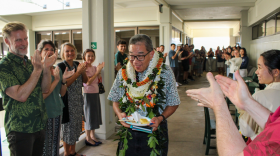University of Hawaiʻi at Mānoa School of Life Sciences researchers were awarded $3 million from the Defense Threat Reduction Agency in the U.S. Department of Defense to create a vaccine against melioidosis.
The DOD is concerned the bacteria can be used for bio warfare in the future.
With a 50% mortality rate, melioidosis is listed by the Centers for Disease Control and Prevention as a tier one select agent, along with Ebola and smallpox.
The disease is endemic to tropical countries 30 degrees north and south of the equator. It is found in water and soil, and can enter the human body through cuts or drinking contaminated water.
The disease killed hundreds of soldiers during the Vietnam War — giving it the nickname 'Vietnam Time Bomb.' The soldiers who were infected by the virus were commonly misdiagnosed with pneumonia or tuberculosis.
Researchers discovered two surface proteins that allow the bacteria to infect human cells. The vaccine works by manipulating these proteins to make it harder to attach to the cells.
Professor Tung Hoang is the leading professor for the research. He explains, "We’ve done successful mice study. The grant will help us to narrow down which of these two proteins or both are important."
"We are also looking at dose — how much is required in a minimum dose. We’re also looking at routes for vaccination — such as intranasal vaccination, or can you inject it into the muscle of mice, or underneath the skin?" he questions.
The vaccines must go through more lab tests before they can be used in clinical trials.




